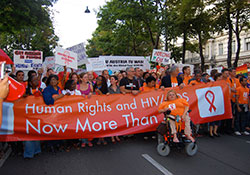Human Rights Day 2012: “My voice counts”

WHO/Doina Lin
Everyone has the right to health; this is the foundation of WHO’s Constitution. WHO/Europe works with civil-society organizations to ensure that groups that experience discrimination and stigma and face challenges in accessing health services – such as transgender people, men who have sex with men, people who use drugs, sex workers, migrants and Roma – are involved in the development of health policies affecting them and are empowered to make decisions about their own health.
Two such civil-society groups are FtM Phoenix, working on issues of transgender health and rights in the Commonwealth of Independent States (CIS), and the Roma Health Fund, a nongovernmental organization (NGO) in the making, advancing the health rights of Roma in Hungary and across Europe.
Health 2020, the European policy for health and well-being adopted by the 53 countries in the WHO European Region in September 2012, recognizes the vital role of civil society as a key actor in formulating, promoting and delivering change:
“Supporting civil society strengthens advocacy for health and equity. … Civil society can often address complex, sensitive or stigmatized issues in a way that official bodies and authorities cannot, particularly by strengthening engagement with marginalized groups who may have been poorly reached previously …”.
“Health 2020 policy framework and strategy” (WHO/Europe, 2012)
Human Rights Day 2012, with the theme “My voice counts”, promotes inclusion and the right to participate in public life.



